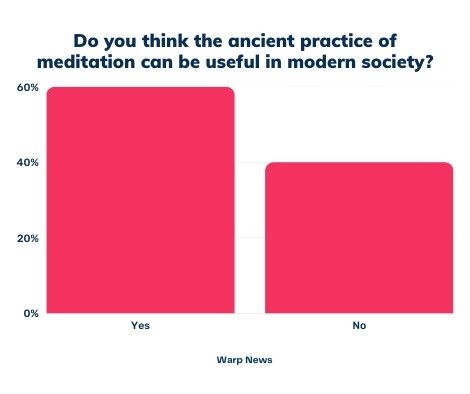
💡 Optimist's Edge: Meditate to improve our overall well-being
Scientific studies are confirming that the ancient practice of meditation can slow down toxic thought flows, bringing great possibilities in the treatment of anxiety and depression.
Share this story!
Meditation has been an integral part of many Eastern religions and philosophies for many centuries. Traditionally it's used to achieve greater mastery of the activities of the mind so it can focus better on a single concept and become absolutely peaceful.
📉 What people think
Can meditation be applied to the needs of modern life? Can it promote an overall improvement in the health of our society and be able to face some severe mental diseases?
We asked 500 people if they think the ancient practice of meditation can be useful in modern society? Yes says 60 percent, no says 40 percent.

📈 Here are the facts
The problems to tackle
- Data says that the two most common mental health diseases in the world are depression and anxiety disorders: about 3.4% of the world population suffers from depression (near 264 million people) while between 2.5 and 7% (about 284 million people worldwide) shows anxiety disorders.
- Common depressive symptoms include decreased concentration and attention, pessimistic visions and excessive worries about the future, loss of interest and enjoyment as well as physical symptoms such as inability to relax, sweating, tachycardia.
- Science seems to agree with identifying Default Mode Network (DMN) dysfunction as one of the main causes of severe mental health diseases such as depression. DMN is a network of interconnected brain subsystems that governs the internal focused brain's tasks such as reflection on oneself and others, planning for the future, and remembering the past. However, an excessive space for the DMN, hence for abstract and self-referential mental rumination, could produce an excessive concentration on a toxic stream of thoughts.

The possible solution
Meditation is not a unitary practice but there are many different techniques for different purposes: the modern application in the therapeutic field is generally called Mindfulness.
The famous Vietnamese Zen monk Thich Nhat Hanh defines it as:
Mindfulnessis a kind of energy that we generate when we bring our mind back to our body and get in touch with what is going on in the present moment, within us and around us. We become aware of our breathing and come home to our body, fully present for ourselves and whatever we are doing.
Meditating means paying attention to our thoughts, to our feelings, calming the flow of thoughts, and carefully evaluating how each thought arises and why.
By allowing us to break toxic thought patterns, meditation could become the next treatment for anxiety and depression.

What science says
- Meditation generally starts with controlling and calming your breathing. The latest studies suggest that calming the breath produces a synchronization between the breath rhythm and the heart rate, which is considered an excellent antidote to stress and anxiety.
- Meditation and DMN. There seems to be evidence that meditation can shape the action of the Default Mode Network, increasing or decreasing it at will through various techniques of mental focusing. Specifically, recent research reports an association between the meditation types defined as "Concentration practices" and the reduction of DMN activity, resulting in improved attention and working memory performance and promoting positive health outcomes.
- Effects of long-term meditation on brain structure. Research showed greater grey matter concentration for meditators in the right anterior insula, a part of the brain strongly linked to self-awareness, while another study reports an increase in the thickness of the hippocampus, the part of the brain responsible for memory and regulating emotions, as well as decreasing the volume of the amygdala, the brain's "fear center," responsible for the fight-or-flight response and the release of the stress hormone cortisol in response to fear or perceived danger.
- Research shows a great similarity between the cerebral area activated by meditation and those subjected to standard psychotherapeutic and pharmacotherapeutic treatments.

The challenges
- Meditation practices are very ancient and delicate, belonging to a different culture from the current one. In order to best apply them to the modern world, it's therefore necessary to understand them better so as not to mislead their original meaning.
- Deepen the scientific study to better investigate the effects of varying the practices, the experience of the meditator, and the depth of the meditative state.
- Try to link each type of practice to a specific need for care or clinical treatment.
- Meditation is not easy to learn and requires long practice, especially for a modern man, therefore it is necessary to devise specific and very accurate teaching paths.
💡 Optimist's Edge
There is enough scientific evidence that the effects of meditation on our body and mind are related to the biological mechanisms of improving attention, emotion regulation, and body awareness with pain reduction.
Furthermore, the technique has been refined over millennia of use, so it can certainly be defined as effective and proven.
💡 Meditation can become the first treatment for mental diseases which doesn't require medical assistance or any specific equipment and has no side effects.
Therefore meditation is much more than clinical treatment, it's also a way of preventing future mental diseases and improving our overall well-being.

👇 How to get the Optimist's Edge
No medical assistance, no special equipment, no side effects, only so many pros. There is no reason not to try and deepen meditation.
❓ So, how do you get the most out of this knowledge?
Learn firsthand
- Meditation is an ancient tradition, long to learn as well as not simple: it's better to first read up, perhaps with famous authors such as the Dalai Lama or Thich Nhat Hahn.
- Better to start the actual practice under the guidance of professionals, maybe in a retreat organized in the magnificent French countryside at the Zen center Plum Village, in the Tuscan hills at the charming Tibetan Institute Lama Tzong Khapa, or in the heart of the Eastern tradition at Kopan Monastery in Nepal.
- You can also practice comfortably at home following specialized apps: Buddhify for meditations on specific problems and conditions, Headspace for guided meditation, or the free app Oak.
Improve collectively
- After experiencing the benefits of meditation firsthand, disseminate your ideas to share the benefits with your friends or colleagues.
- Are you a medical student or a researcher? Participate in Mindfulness and Meditation research programs at Oxford University, Brown University, UCLA, and many others.
- Since meditation allows us to focus deeply on a single issue, it could be a good way to focus our energies on social engagement. The American scholar David Robert Loy in the book "Ecodharma: Buddhist Teachings for the Ecological Crisis" suggests how the practice of meditation carried out in nature, focused on the challenges of climate change and eco-sustainability, could help to develop an ecological mind and to translate their ideas into concrete actions. You can contribute by organizing group meditation sessions focused on developing a green mindset and how to effectively influence current issues with your social engagement.

You now have an edge because you have gained this knowledge before most others –
